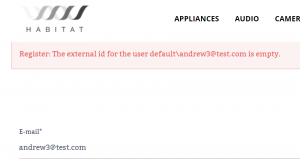In this article, we will review and compare Sitecore Experience Commerce customers and OrderCloud buyer users to facilitate developers looking to transition from XC to OrderCloud as well as identify a path for migration of existing XC solutions to OrderCloud.
We will look at a high-level comparison of architecture, functionality, and data models, with greater focus on transitioning from Sitecore Experience Commerce, meaning identifying a close path to parity in OrderCloud, using the Habitat catalog and SXA Storefront.
Customers
The Customer to Storefront Association
In an XC SXA implementation, customer accounts are registered under a security domain, which can be configured in the Content Editor on the /sitecore/Content/<tenant>/<site>/Settings/Site Grouping/<storefront> item.
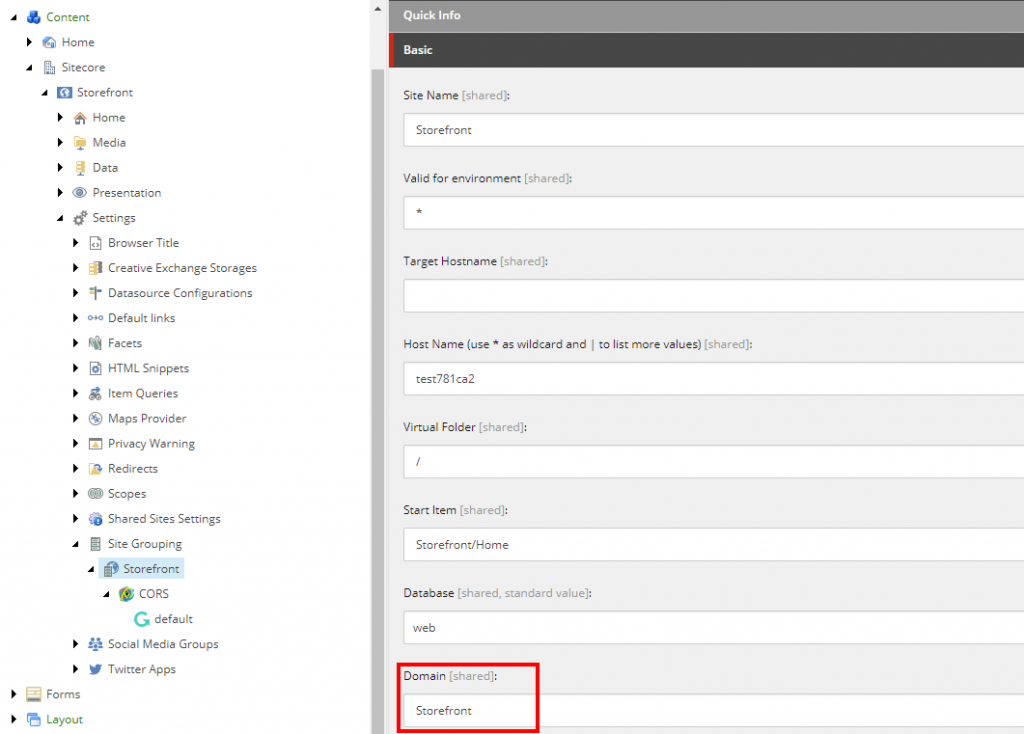
Customers can only be registered to a single security domain and will not be accessible in storefronts configured to a different domain. A separate customer account would need to be created under the other security domains, but it would have no knowledge or relationship to accounts across domains. However, a security domain can be registered to multiple storefronts allowing a customer to share an account across storefronts.
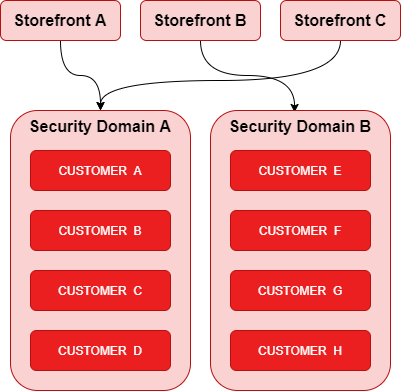
In OrderCloud, customers can be represented as buyer users, which are registered under buyer companies, and can only belong to a single buyer company. This can be compared directly to the relationship between security domains and customers.
The relationship of a buyer to an OrderCloud storefront is not tightly coupled like the SXA storefront. Access to an OrderCloud storefront is managed through API clients, security profiles and their assignments to buyers. See Getting Started > Establishing API Access for more information.
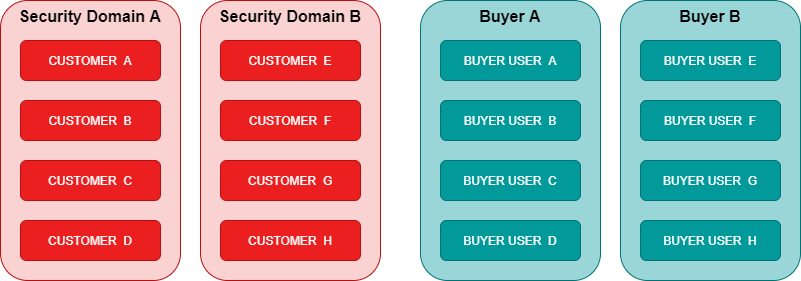
The Customer to Catalog Association
Buyers also contain a DefaultCatalogID property, which will create an associated catalog with an ID matching the buyer ID if not specified during the creation of a buyer. While it may seem like this limits Buyer A to a single catalog (Catalog A), multiple catalogs can be assigned via OrderCloud’s catalog assignments, which matches XC’s equivalent in supporting both Catalog A and Catalog C associations to Security Domain A via storefronts (figure 4).
The DefaultCatalogID property will be utilised in certain APIs when a catalogID is not supplied in their request, however this can be overridden. For now, it is only important to understand that this is not a limiting factor in OrderCloud functionality for migration of data or functionality.
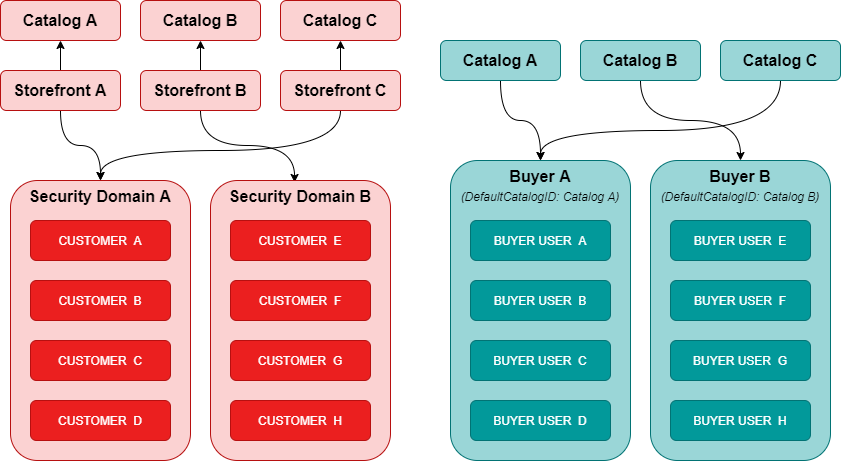
OrderCloud User Groups
OrderCloud also allows buyer users to be assigned to one or more buyer user groups, which can be used to supersede assignments to buyer users in bulk, e.g. provide access to special pricing for VIP buyer users.

Over in XC, a common customisation is an implementation of customer groups to assign customers in order to provide customer-group specific pricing, promotions, etc. While the implementation details may have the customer group represented as a separate custom entity or a property on a customer, conceptually both approaches achieve the same outcome (figure 6) and are on par with OrderCloud’s architecture (figure 5), allowing a seamless transition path to OrderCloud.

Customer Addresses
In XC, customers have explicit addresses associations as the address component lives on the customer entity. The IsPrimary flag is used to allow a default address selection in implementations.

To bring across customer addresses into OrderCloud, figure 8 shows that we can create buyer user addresses, via the /me/addresses resource, creating a custom IsPrimary flag in the buyer address xp.

Buyer user addresses, also contain Shipping and Billing properties, which can facilitate filtering addresses for the purpose of being retrieving and setting for an order’s shipping address or billing address respectively. As the SXA Storefront allows customer addresses to be used for both of these addresses, these flags should also be set to true.
Data Mapping
With the conceptual analysis above, we will now review what data mapping would look like for migration and from a comparison standpoint.
In the XC Entity/Component column, components are assumed to live on the primary XC entity being mapped.
OrderCloud IDs do not allow spaces. It is important that the IDs are parsed to remove/replace invalid characters consistently.
Buyers
The DefaultCatalogID property will be reviewed further during the catalog analysis article.
| OC Property | Data Type | Required | XC Entity/Component | XC Property | Data Type | Notes |
|---|---|---|---|---|---|---|
| ID | string | No | Customer | Domain | string | |
| Active | string | Yes | N/A | N/A | N/A | Set to true by default. |
| Name | string | No | Customer | Domain | string | |
| DefaultCatalogID | string | Yes | N/A | N/A | N/A | Assign to an existing catalog or PATCH later. |
| xp | object | No | N/A | N/A | N/A | Any custom fields can be mapped to xp. |
Buyer Users
There are a few properties in OrderCloud are required while not mandatory in the SXA Storefront, so considerations for handling these properties will need to be made in these instances, e.g. applying fallback values.
| OC Property | Data Type | Required | XC Entity/Component | XC Property | Data Type | Notes |
|---|---|---|---|---|---|---|
| buyerID | string | Yes | Customer | Domain | string | Is a resource parameter, not body property. |
| ID | string | No | Customer | FriendlyId | string | |
| Username | string | Yes | Customer | LoginName | string | |
| Password | string | No | N/A | N/A | N/A | Password should not be migrated. |
| FirstName | string | Yes | Customer | FirstName | string | Not a mandatory field in SXA, so a fallback value will need to be populated. |
| LastName | string | Yes | Customer | LastName | string | Not a mandatory field in SXA, so a fallback value will need to be populated. |
| string | Yes | Customer | string | |||
| Phone | string | No | CustomerDetailsComponent | PhoneNumber | string | The XC PhoneNumber exists under an entity view of the CustomerDetailsComponent, so consider this a rough mapping. |
| TermsAccepted | string | No | N/A | N/A | N/A | |
| Active | boolean | Yes | Customer | AccountStatus | string | Set to true where AccountStatus == "ActiveAccount" |
| xp | object | No | N/A | N/A | N/A | Any custom fields can be mapped to xp. |
Buyer User Addresses
OrderCloud only stores the ISO 3166-1 alpha-2 2-letter country code. Retrieving additional country details, such as country name, would best be handled by custom middleware, outside of OrderCloud.
| OC Property | Data Type | Required | XC Entity/Component | XC Property | Data Type | Notes |
|---|---|---|---|---|---|---|
| Shipping | boolean | No | N/A | N/A | N/A | Set to true |
| Billing | boolean | No | N/A | N/A | N/A | Set to true |
| FirstName | string | No | AddressComponent | FirstName | string | SXA Storefront does not capture FirstName. May wish to use Customer.FirstName instead. |
| LastName | string | Yes | AddressComponent | LastName | string | SXA Storefront does not capture LastName. May wish to use Customer.LastName instead. |
| Street1 | string | Yes | AddressComponent | Party.Address1 | string | |
| Street2 | string | No | AddressComponent | Party.Address2 | string | |
| City | string | Yes | AddressComponent | Party.City | string | |
| State | string | Yes | AddressComponent | Party.StateCode | string | Can also use Party.State for full state name, depending on requirement. |
| Zip | string | Yes | AddressComponent | Party.ZipPostalCode | string | |
| Country | string | Yes | AddressComponent | Party.CountryCode | string | |
| Phone | string | No | AddressComponent | Party.PhoneNumber | string | Will be empty in SXA Storefront default implementation. May wish to use Customer.[CustomerDetailsComponent].PhoneNumber instead. |
| AddressName | string | No | AddressComponent | Party.AddressName | string | |
| xp | object | No | N/A | N/A | N/A | Any custom fields can be mapped to xp. |
| xp.IsPrimary | object | No | AddressComponent | Party.IsPrimary | boolean |
References
- Sitecore: Customers
- Sitecore: Security Domains in SXA Storefront
- OrderCloud: OrderCloud Basics > Building Blocks
- OrderCloud: Getting Started > Establishing API Access
- OrderCloud: Product Catalogs > Default Buyer Catalog
Continue the Series
- Transitioning from Sitecore Experience Commerce to OrderCloud: Customers to Buyer Users
- Transitioning from Sitecore Experience Commerce to OrderCloud: Customers and Buyers – API Access
- Transitioning from Sitecore Experience Commerce to OrderCloud: Catalogs and Categories
- Transitioning from Sitecore Experience Commerce to OrderCloud: Sellable Items To Products
- Transitioning from Sitecore Experience Commerce to OrderCloud: Inventory and Pricing
- Transitioning from Sitecore Experience Commerce to OrderCloud: Carts to Unsubmitted Orders and Carts
- Transitioning from Sitecore Experience Commerce to OrderCloud: Fulfillments to Shipping
- Transitioning from Sitecore Experience Commerce to OrderCloud: Tax and Payments
- Transitioning from Sitecore Experience Commerce to OrderCloud: Orders
- Transitioning from Sitecore Experience Commerce to OrderCloud: Order Workflow and Minions
- Transitioning from Sitecore Experience Commerce to OrderCloud: Promotions



